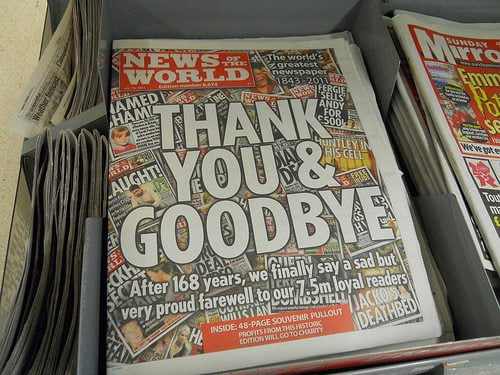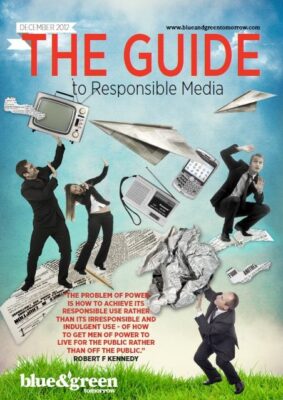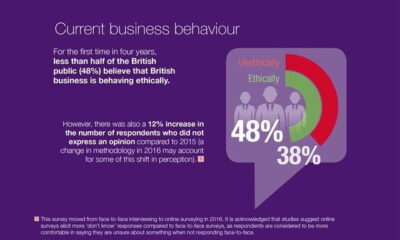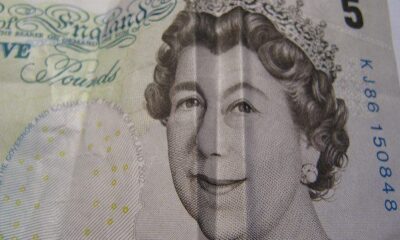

Features
On this day in 2011: News of the World ceases publication
“Thank you & goodbye” was the headline of the final edition of News of the World in July 2011, following the allegations that the title had hacked murdered schoolgirl Milly Dowlers’ mobile phone. After 168 years of publishing, one of the UK’s most successful, respected and feared newspapers was abruptly closed.
Evidence of illegal payments for information goes back as far as 1999. The Metropolitan Police’s Operation Nigeria uncovered that a private investigator, Jonathan Rees, had bought information from serving officers during the 90s and sold it to national newspapers, including News of the World.
In 2003, editor of the Sun Rebekah Brooks (then known as Wade) admitted to a parliamentary committee that paying police for information was commonplace. Brooks had been editor of News of the World between 2000 and 2003.
Between 2005 and 2006 the royal phone hacking scandal emerged when the private conversations of Prince William were covered in News of the World by Clive Goodman. He and private investigator Glenn Mulcaire pleaded guilty to hacking the phones of royals in January 2007 and Andy Coulson, the newspaper’s editor, resigned on the same day.
Internal News International and police investigations suggested their actions were that of a ‘rogue reporter’, despite glaring evidence that such behaviour was widespread.
It wasn’t until July 4 2011, when the Guardian reported the hacking of Milly Dowlers’ mobile phone, that this defence started to crumble. On July 6, the Daily Telegraph reported that the voicemails of British soldiers killed in action had been hacked. Several 7/7 London attack victims had similarly been targeted. Thousands more victims were revealed in the weeks, months and years that have followed.
The fallout was dramatic.
Advertisers boycotted the newspaper, essentially signing its death warrant. Coulson resigned from his position as the prime minister’s communications director, a position he had been given after the royal phone hacking scandal. Rupert Murdoch withdrew his bid for total control of BSkyB. Many senior directors of News Corporation and News International resigned, were dismissed or suspended.
Forty-two executives and journalists from across News International’s UK titles have been charged and now face criminal prosecution, if they haven’t already been convicted. Fifty-six are still on bail. More arrests are expected.
At the time, News Corporation may have taken out a full page advert in most nationals newspapers to say, “We’re sorry”, signed by Murdoch, but recent revelations suggest that his mea culpa was less than sincere.
Murdoch effectively relaunched News of the World as the Sun on Sunday on February 26 2012, diminishing the significance of his decision to close the title. It had long been suspected that he wanted to merge the publications into a seven-day operation. The Milly Dowler scandal simply forced his timetable. As was reported in the trade press, trademarks and URLs for a Sunday edition of the Sun had been registered before the final edition of News of the World was published.
The Sun on Sunday sold 1.9m copies on average during April, down from the 2.6m the NoTW sold during its final month, but it is still the largest Sunday title.
The many inquiries, not least the Leveson inquiry, rumbled on for months and public interest has gradually waned. We have still not resolved the issue of regulating the behaviour of the press. Most recently, Lord Prescott, one of the phone hacking victims, took the unusual step of resigning from the Privy Council due to what he sees as an overly political deal between national newspapers and the executive to block limits on press freedom.
And then, earlier this month Exaro News ran audio extracts of private comments made by Murdoch to executives and reporters at the Sun in March. In it, he railed against the police and indicated that he knew bribing public officials had been endemic for years.
Police are now investigating the recording and Murdoch has been summoned before the culture, media and sports select committee. In a statement, a spokesperson for News Corporation said, “Mr Murdoch welcomes the opportunity to return to the select committee and answer their questions. He looks forward to clearing up any misconceptions as soon as possible.”
See below to watch a 1994 parody by Stephen Fry and Hugh Laurie of what Britain would have been like without Murdoch.
Further reading:
A short history of trying to regulate an irreverent, unruly and opinionated press
Freedom of expression is not the same as a freedom to mislead
Is trash media responsible for a lack of positive role models?


 Environment10 months ago
Environment10 months agoAre Polymer Banknotes: an Eco-Friendly Trend or a Groundswell?

 Environment12 months ago
Environment12 months agoEco-Friendly Home Improvements: Top 7 Upgrades for 2025

 Features9 months ago
Features9 months agoEco-Friendly Cryptocurrencies: Sustainable Investment Choices

 Features10 months ago
Features10 months agoEco-Friendly Crypto Traders Must Find the Right Exchange






























